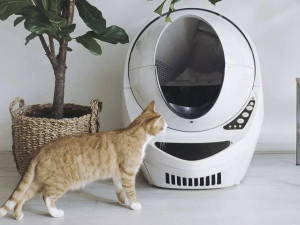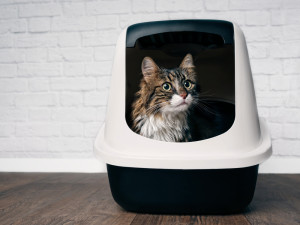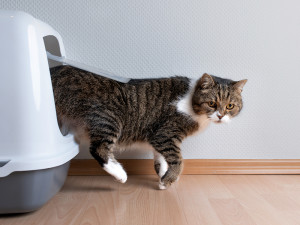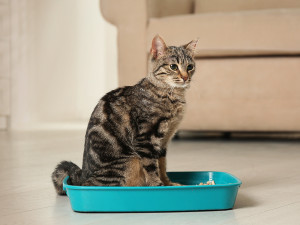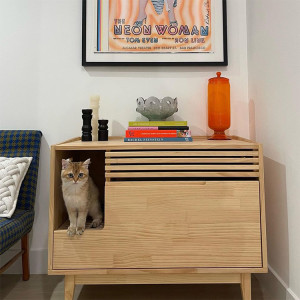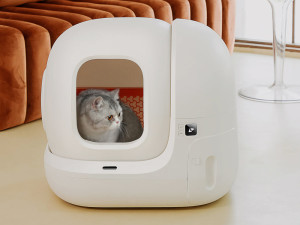Why Does My Cat Pee on My Clothes?
Now, that’s no one’s preferred perfume scent.

Share Article
In This Article:
Medical Reasons for House-Soiling Behavioral Reasons for Cat Peeing on Clothes How to Stop a Cat from Peeing on Clothes Frequently Asked Questions
If you’ve ever found your cat peeing on your clothes, you know how frustrating this behavior can be. While it might seem like your cat is acting out of spite (which cats don’t actually understand), there are usually underlying medical or behavioral reasons behind house-soiling behaviors.
So, if your cat has ever used your clothes as a substitute toilet, read on for insights about why your cat might be doing this, and how to get them to stop.
Medical reasons for house-soiling
Medical reasons are the first thing to examine (and rule out) if your cat has been peeing on your clothes. Many medical conditions are painful, which can cause cats to develop a negative association with the litter box, and cause them to look for a softer place to urinate… and what could be softer than a pile of laundry sitting on the floor? Here are some (but not all) potential medical reasons why your cat might be urinating outside of the litter box:

Urinary tract infections (UTIs)
Urinary tract and bladder inflammation and infections can cause a tremendous amount of pain or discomfort, and a cat who is suffering from these conditions may make repeated attempts to urinate and cry out in pain and perhaps have blood in their urine. While things like diet and kidney function can cause UTIs, they can also be caused by stress.
Bladder stones or crystals
There are two types of urinary stonesopens in new tab, or “uroliths” that cats can get — struvite and calcium oxalate. These stones can collect in the bladder, urethra, or both, and can cause obstruction in the urethra; these crystals can be exceptionally painful to pass and any blockage must be treated with an immediate vet visit (this condition can be fatal in male cats within a short period of time).
Kidney and thyroid diseases or diabetes
While issues with the kidney and thyroid or diabetes don’t cause pain while urinating per se, these diseases can cause a cat to drink more wateropens in new tab or pee more. If you’re not keeping the litter box clean in response to the increased usage, your cat might have a problem with that.
Age-related house-soiling
Older cats may have a harder time getting to the litter box or using the litter box, especially if they are dealing with a disease or condition that interferes with their mobility (like arthritis).
Top-loading litter boxes or litter boxes with high sides that require a jump to get into, or litter boxes accessed only by going up/down a set of stairs may be difficult to use by older kitties. Additionally, cognitive decline in some older cats can cause confusion about where the litter box is and prevent cats from getting to the box in time.
Behavioral reasons for a cat peeing on clothes
Once you’ve ruled out medical reasons for your cat’s house-soiling behaviors, you can begin to look at behavioral reasons for why your cat might be soiling your clothes. Here’s where to start:
Litter box issues
This is a big one, and there are so many things about litter boxes that your cat may not like. It could be the box itself (they’re often not big enough), the location of the box (placed in an area that feels unsafe, is too far away, not easily accessible, or open to ambush from another pet), or the litter (they often have unpleasant fragrances or an off-putting texture). Or, you simply may not have enough litter boxes for your cat to choose from — some cats like to pee and poop in different locations, or don’t like to share litter boxes with other cats.
Stress and anxiety
Is there something in your home that could be causing your cat stress or anxiety? This is another reason why cats will sometimes urinate on your clothes. Intermingling their scent with your scent can be a self-soothing behavior when something is wrong, and it’s not meant to be an insult.
Conflict with other pets or family members
One of the biggest sources of stress to a kitty is the relationship they may have with other cats, pets, or even people in the home. Is there a cat or dog who blocks access to the litter box? Is your cat competing with another pet for a primary resource (like food, water, napping spots, or opportunities for play)?
Marking behavior
Marking (even with urine!) is a natural behavior in cats. However, stress and inter-cat relationships can sometimes combine to cause cats to urine-mark inside the home, which is not an ideal situation for most humans. Cats will urine-mark to help themselves feel more territorially secure, especially when there’s another cat who is threatening their territory and/or high stress levels cause a sense of insecurity.
How to stop a cat from peeing on clothes
How do you know whether a cat is peeing on your clothes due to a medical or behavioral issue? And once you do know, how can you fix the problem? Here’s a four-step process you can follow to guide your cat back to happiness and the litter box.
1. Visit the veterinarian
Taking your cat to see a veterinarian isn’t the most fun thing to do, but it’s an absolute necessity if your cat is urinating on your clothes or anywhere else other than their litter box. Your vet will probably want to do a blood test and a urinalysis. If your cat’s issue is medical, no amount of behavioral interventions will fix the problem; medical reasons for your cat’s behavior must be identified and resolved first. Then, if your kitty is still peeing outside of their litter box, behavioral issues can be examined.
2. Clean soiled areas thoroughly with enzymatic cleaners
It’s also important to get rid of all urine smells wherever your cat has peed outside of their litter box, or you could find them repeating the behavior. Enzyme cleaners are the best thing to use to break down urine so that they don’t smell. If your cat urinates on your clothes, soak the clothing in an enzyme cleaner solution for up to 20 minutes, then wash as you normally would.
3. Improve litter box conditions
Humans don’t love using porta-potties, so why would a cat like to use something similar? Set your litter boxes up so that they are more appealing to your cat. Actually, make it so that your cat wants to use them (short of soft spa music and candle-light). Make sure you have enough litter box locations in your home (the number of cats you have plus one). Additionally, most cats prefer an uncovered, large, standard litter box. Use an unscented fine-grained clumping cat litter and your cat will thank you! Finally, make sure you are scooping clumps out of your litter boxes at least once per day. Nobody wants poopy paws.
4. Reduce stress and anxiety in the home
Reducing stress and anxiety can be challenging, especially if you don’t know where the stress is coming from. But at the very least, stress can be reduced with daily play sessions with your cat, and environmental enrichment, such as vertical space options and plenty of places to nap and perch. If you have a multi-cat family, make sure primary resources are duplicated throughout the home and that there is plenty to go around for everyone.
If you need further help with reducing stress and anxiety, or repairing the relationship your cat has with another pet or person, you may want to reach out to a qualified cat behavior consultant or a veterinary behaviorist. They can help you and your kitty figure out what’s going on and give you solutions to getting your cat happily back to using the litter box.
FAQs (People also ask):
Why is my fixed female cat peeing on my clothes?
Your spayed female cat could be peeing on your clothes for several reasons, including having a urinary tract infection (UTI) kidney or thyroid diseases or diabetes, or because age-related conditions are making it difficult for her to get to the litter box. She may also not like the litter box setup, or may be experiencing stress or anxiety in the home.
Why is my male cat peeing everywhere?
If your male cat is peeing everywhere in your home, you’ll want to first make sure he’s neutered, and then help him with litter box-training. Having the correct number of litter boxes, the right type of box, and the right type of litter is key. If he’s an adult cat, you’ll want to make sure that he doesn’t have a medical issue that is causing his behavior, and that his stress levels are as low as possible.
Why does my cat pee on my bed?
Cats pee on beds when something is wrong: There’s a medical issue, a behavioral issue, or a combination of the two factors. It’s important to see a veterinarian right away to rule out medical problems, then make sure that your cat’s litter box setup is in tip-top shape and that your kitty’s stress level is set to mellow.
References:

Marci Koski
Marci Koski fell in love with cats as a toddler and never looked back, even leaving a career as an endangered species biologist for the U.S. Fish and Wildlife Service to start her own cat behavior consulting service, Feline Behavior Solutions in 2014. Since then, Marci has been helping people resolve their cat behavior issues by teaching people “how to cat” — namely, how to give their cat the resources and environments they need to thrive with their human companions.
Marci has a PhD in Fishery and Wildlife Biology, and earned her specialized and advanced Feline Training and Behavior certifications through the Animal Behavior Institute.
Related articles
![a cat peeks out of a litter box lid]()
5 Litter Boxes Your Cat Likely Won’t Reject
Think like a cat when choosing a litter box... so you can go back to not thinking about litter boxes.
![cat coming out of litter box]()
What to Do When Your Cat Refuses to Be (Litter) Boxed In
An expert explains why kitties are so particular about where they pop a squat.
![Cat sitting in a teal litter box]()
How to Train a Cat to Use a Litter Box
If you do nothing else, teach your cat to poop in their litter box (not your shoe).
![Maine coon cat using the litter box.]()
Uncovered Secrets: Why Cats Don’t Always Cover Their Poop
And how you can encourage them to cover up after doing their business.
![Small orange cat in wooden litter box.]()
9 Litter Box Enclosures That Aren’t Total Eyesores
Keep your cat’s litter box out of sight — but easy to scoop.
![cat in white electronic litter box]()
Finally, a Litter Box That’s Thought of Everything
An electric litter box for techy cat parents and their tactful felines.


